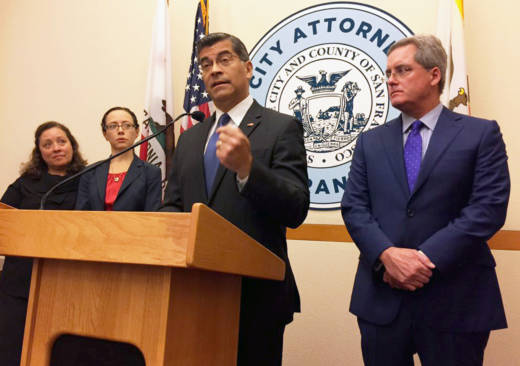The suit on behalf of California will be the first of its kind, Becerra said, brought by an entire state that challenges the constitutionality of cutting federal grants for cities that minimize cooperation with U.S. immigration agents. Becerra had previously written in support of San Francisco's suit against Trump's executive order.
"Today we will file a lawsuit to join with the city of San Francisco to make it clear we’re intent on fighting crime," Becerra said. "We’re intent on gaining the resources we need."
Both Herrera and Becerra stressed that local and state law enforcement officials are in the best position to make decisions about how California and its cities should use its resources, not the federal government. Becerra said the state has the resources that many smaller localities don’t have to take on the “bullying” of the federal government.
"What the Trump administration is trying to do is unconstitutional," Becerra said. "It’s unlawful. Why should I permit that to occur? We abide by federal law. We abide by the Constitution. So should the federal government."
San Francisco's first lawsuit against the Trump administration over sanctuary cities led a federal judge in April to block the president's executive order, which would have broadly denied federal funding to sanctuary cities.
In May, Sessions released a memo narrowing the executive order's scope to deny only select federal law enforcement grants — JAG funds — to cities that do not willingly exchange information about the immigration status of an individual. The memo left open the possibility that the federal government could impose additional conditions on future grants, which is exactly what happened last month.
The Department of Justice announced on July 25 that jurisdictions requesting JAG funds for the upcoming fiscal year would have to agree to provide immigration officials access to local jails and alert them 48 hours before undocumented immigrants were set to be released.
"There is nothing in the Byrne grant statute that would suggest that this was an appropriate part of the program," said Lena Graber, an attorney with the Washington, D.C.-based Immigrant Legal Resource Center. "It seems clearly illegal, but the administration doesn't care because they're just determined to take whatever steps they can to really force local law enforcement agencies and local governments to be the foot soldiers in their anti-immigrant campaigns."
On Monday, Becerra cited studies finding that sanctuary policies have a positive impact on public safety and said federal immigration policy is based on the misguided belief that immigrant communities pose a danger to public safety.
"We are here to say to every one of the people who lives in our city and in our state, if you're here to build this city and our state, if you're here to work hard, then we want you to know that you'll be safe," Becerra said.
Chicago filed a similar lawsuit last week, arguing that the Trump administration's bid to withhold public safety grants from so-called sanctuary cities is illegal.
Sessions has said the Trump administration "will not simply give away grant dollars to city governments that proudly violate the rule of law and protect criminal aliens."
In a statement on Monday, a U.S. Department of Justice spokesman said: "Given the multiple high-profile incidents that have occurred in California in recent years, it is especially disappointing that state leaders would take steps to limit cooperation between local jurisdictions and immigration authorities that are trying to keep Californians safe."
Read San Francisco's latest lawsuit below.
